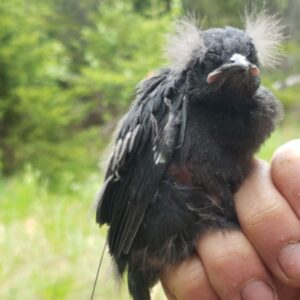(by Carol Foss)
As we await installation of the last two New England Motus receiving stations funded by a 2020 grant from the U.S. Fish and Wildlife Service, a new Fish and Wildlife Service grant for the regional Motus network is just beginning. The new grant, which spans the eastern United States from Maine to Alabama, will support maintenance of 150 existing receiving stations in the New England and mid-Atlantic states as well as installation of 30-40 new stations in the southeastern states.
NH Audubon biologists will be deploying nanopins on Monarch butterflies again this year. Tagging sites will include the Great Bay National Wildlife Refuge in Newington and the McLane Center in Concord. We anticipate installation of a receiving station at McLane in the next few weeks, so both sites will be able to document departure of the tagged individuals. One Monarch tagged in Concord last year was subsequently detected at our Massabesic Center in Auburn, two in Lynnfield MA, and one in Pomfret, CT. An individual tagged at the Massabesic Center was detected at Massachusetts Audubon’s Drumlin Farm in Concord, MA.

The Rusty Blackbird field crew has deployed 12 tags this year. We are currently doing our best to document their post-breeding movements with mobile receiving equipment. Our network of northern receiving stations is also detecting many of these birds as they travel around the upper Androscoggin watershed and will document their departure from Coos County in late September or early October.
The eight New Hampshire Motus stations installed under the 2020 grant made 209 detections between July 1, 2022 and June 30, 2023. In addition to our locally tagged Monarchs and Rusty Blackbirds, these detections included tags on 21 species deployed by 19 research projects from Quebec and New Brunswick to Costa Rica and Jamaica. We look forward to discovering who crosses the New Hampshire skies during the upcoming fall migration!
